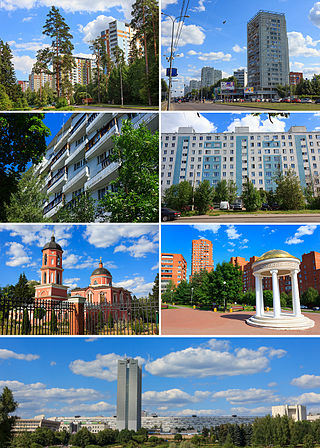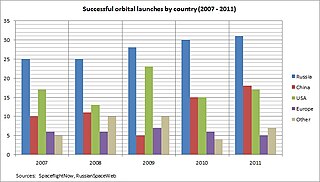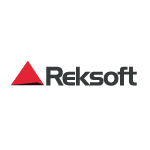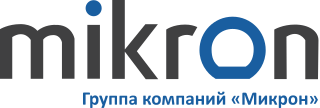
Zelenograd is a city and administrative okrug of Moscow, Russia. The city of Zelenograd and the territory under its jurisdiction form the Zelenogradsky Administrative Okrug (ZelAO), an exclave located within Moscow Oblast, 37 kilometers (23 mi) north-west of central Moscow, along the M10 highway. Zelenograd is the smallest administrative okrug of Moscow by area, the second-lowest by population, and the largest Moscow exclave by area and by population within Moscow Oblast. Zelenograd, if it were a separate settlement, would be the fifth-largest city in Moscow Oblast and one of the 100 largest cities of Russia. Before the expansion of the territory of Moscow in 2012, Zelenograd occupied second place among the administrative okrugs of Moscow, second only to the Eastern Administrative Okrug, in terms of the share of greenery in its total area.
ISO/IEC 15693, is an ISO/IEC standard for vicinity cards, i.e. cards which can be read from a greater distance as compared with proximity cards. Such cards can normally be read out by a reader without being powered themselves, as the reader will supply the necessary power to the card over the air (wireless).

National Research University of Electronic Technology is a Russian technical university in the field of microelectronics, information and computer technologies and one of 29 National Research Universities. University was founded in 1965 and is based in Zelenograd, Moscow.

AFK Sistema PAO is a large Russian conglomerate company, founded by Vladimir Yevtushenkov, who was chairman of the corporation's board of directors until 2022. In April, Yevtushenkov's shareholding in Sistema has decreased to 49.2%, and he also stepped down from Sistema's board.
Roxar AS was a provider of products and associated services for reservoir management and production optimisation in the upstream oil and gas industry. Roxar was headquartered in Stavanger, Norway and operated in 19 countries with around 900 employees. Roxar offered software for reservoir interpretation, modelling and simulation, as well as instrumentation for well planning, monitoring, metering and production optimisation. Roxar was acquired by Emerson Electric Company in April 2009.

Russia's space industry comprises more than 100 companies and employs 250,000 people. Most of the companies are descendants of Soviet design bureaux and state production companies. The industry entered a deep crisis following the dissolution of the Soviet Union, with its fullest effect occurring in the last years of the 1990s. Funding of the space program declined by 80% and the industry lost a large part of its work force before recovery began in the early 2000s. Many companies survived by creating joint-ventures with foreign firms and marketing their products abroad.

Reksoft is a Russian multidisciplinary consulting and technology group of companies delivering a full cycle of digital transformation services, from business strategy formation and transformation management to deployment of information systems, custom software development and support, tailored industrial automation projects implementation. Reksoft Group includes the companies Reksoft, Reksoft Consulting, RNT Group, Reksoft.Labs.

The Skolkovo Innovation Center is a high technology business area at Mozhaysky District in Moscow, Russia.

The satellite navigation system GLONASS was conceived in the late 1960s, and formal requirements were completed in 1970. The government of the Soviet Union made a decision to develop the system in 1976. Design work was carried out by specialists led by Vladimir Cheremisin at NPO PM in Krasnoyarsk-26. The first launch took place in 1982. Until its dissolution in 1991, the Soviet Union launched 43 GLONASS-related satellites. Work on the system was continued by the Russian Federation which brought it its full operational capability in 1995. In the following years, the system fell into disrepair due to the economic crisis in the country and diminished space funding. Starting from 2000, the government under President Vladimir Putin made the restoration of GLONASS a top priority; its funding was doubled and after a lull of several years, launches were restarted again. In 2003, a new satellite design, GLONASS-M, was introduced. By early 2011, GLONASS had 22 operational satellites, two short of the required constellation of 24 to provide global coverage. The latest and significantly improved satellite type, GLONASS-K, was launched in February 2011.
Multicore is a series of 32-bit microprocessors with embedded DSP cores developed by ELVEES, Russia. The microprocessor is a MIPS32 core or an ARM Cortex-A9 core. Some of the processors in the series are radiation hardened (rad-hard) for space applications.

Elbrus-2S+ is a multi-core microprocessor based on the Elbrus 2000 architecture developed by Moscow Center of SPARC Technologies (MCST). There are multiple reports regarding the evolution of this technology for the purpose of import substitution in Russia, which was raised by several ministries in July 2014, due to economic sanctions in response to 2014 pro-Russian unrest in Ukraine. In December 2014, it was announced that Mikron Group started pilot production of a dual-core variant of this microprocessor called Elbrus-2SM using a 90 nanometer CMOS manufacturing process in Zelenograd, Russia.
Angstrem JSC is a Moscow-based company involved in the design and fabrication of electronic products and semiconductors. It produced a range of Soviet-era integrated circuits. After the fall of the Soviet Union, in 90s it has produced a line of calculators and bank cards.
The MTS 945 GLONASS was the world's first smartphone that was compatible with GLONASS. The phone was available from Mobile TeleSystems, and was built by Qualcomm and ZTE. The phone was released on March 31, 2011. The phone was discontinued following low sales numbers.
JSC Ruselectronics, is a Russian state-owned holding company founded in 1997. It is fully owned by Rostec.

Mikron Group, headed by JSC Mikron, is the leading developer, manufacturer and exporter of microelectronics in Russia and the CIS. Its main manufacturing facilities are located in Zelenograd, Russia. Other production facilities of the group are located in St.Petersburg and Voronezh. Part of the Element conglomerate.

Sergey Aslanyan is a Russian businessman and executive manager. He is the founder and Chairman of the Board at MaximaTelecom.

Evgeny Grigorievich Novitsky is a Russian engineer and entrepreneur, former president of the large AFK Sistema conglomerate which holds many diversified businesses. He is also the chairman of the trustee board of the Bauman Moscow State Technical University, which he graduated from in 1985. Nowadays he is one of the chairmen of the electronics production company RTI Systems.

RTI Systems is one of the largest defense contractors in Russia, with revenues for $753.5 million in 2016. RTI develops and produces long-horizon radars, information tools, rocket technology, integrated communication, and safety systems.

Evgeni Utkin is a Ukrainian entrepreneur and one of the pioneers and leaders of the high-tech industry in CIS and CEE, a philanthropist, active in promotion of Ukrainian culture through his support of art and music projects both in Ukraine and Europe. Chevalier of The Order of Arts and Literature.












